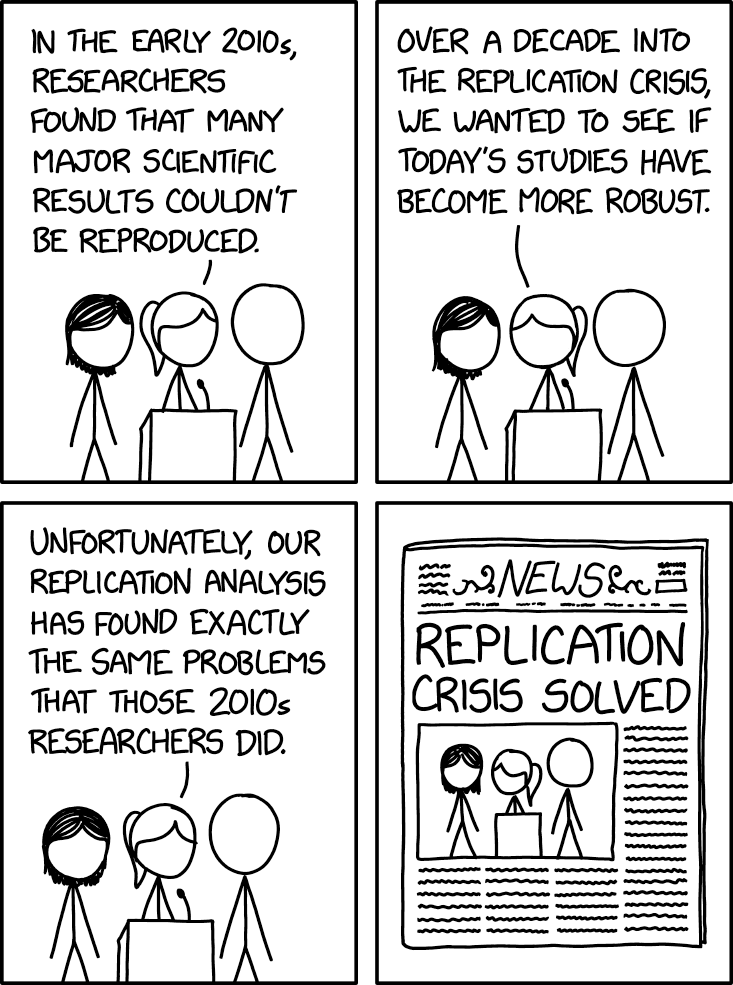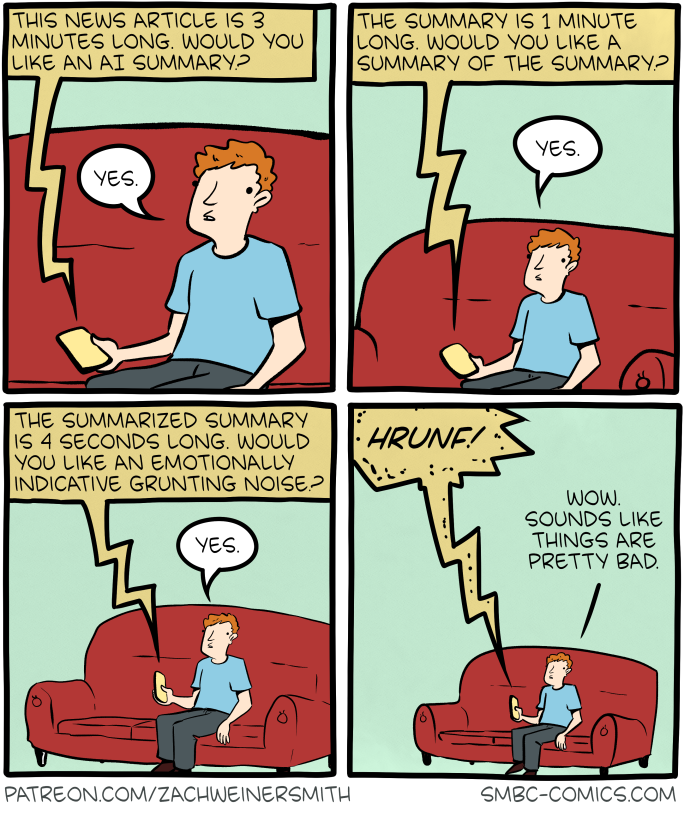Replication of failure to replicate
Mouseover title: "Maybe encouraging the publication of null results isn't enough–maybe we need a journal devoted to publishing results the study authors find personally annoying."
Read the rest of this entry »
Anti-bilingualism in the news
Complaint upheld against Belgian ticket inspector who said ‘bonjour’ in Flanders
Ilyass Alba also said ‘goeiedag’ on train in Dutch-speaking region but he breached country’s strict language rules
Jennifer Rankin in Brussels, The Guardian (16 Jul 2025)
Go figure! The train was in Flanders and nearing Brussels, which is officially bilingual.
A complaint against a Belgian ticket inspector who gave passengers a bilingual greeting in Dutch-speaking Flanders has been upheld, shedding light on the country’s strict language laws.
The conductor, Ilyass Alba, said Belgium’s Permanent Commission for Linguistic Control [sic, a quasi-judicial body in Belgium] had upheld a complaint made by a commuter in 2024. The passenger had objected to Alba’s use of the French word “bonjour” while the train was in Dutch-speaking Flanders.
Read the rest of this entry »
A dashing wizard
From Jesse Sheidlower:
I hereby offer to supervise an MA thesis focused entirely on this one passage.
#linguistics
— Jesse Sheidlower (@jessesword.com) July 17, 2025 at 2:02 PM
Read the rest of this entry »
The impact of different languages on our thinking and doing
The Weird Way Language Affects Our Sense of Time and Space
The languages we speak can have a surprising impact on the way we think about the world and even how we move through it.
Matt Warren and Miriam Frankel
This post originally appeared on BBC Future and was published November 4, 2022. This article is republished here (getpocket, Solo) with permission.
When I first scanned this article, I thought it was so lackluster, especially on contentious waters that we had successfully navigated just a few weeks ago (see "Selected readings"), I decided not to write about it on Language Log. However, several colleagues called the article to my attention and said that it raised interesting questions, so I have gone ahead and posted on it despite my reservations.
Read the rest of this entry »
Interpersonal and socio-cultural alignment
In a comment on "Alignment", Sniffnoy wrote:
At least as far as I'm aware, the application of "alignment" to AI comes from Eliezer Yudkowsky or at least someone in his circles. He used to speak of "friendly AI" and "unfriendly AI". However, the meaning of these terms was fairly different from the plain meaning, which confused people. So at some point he switched to talking about "aligned" or "unaligned" AI.
This is certainly true — see e.g. Yudkowsky's 2016 essay "The AI alignment problem: why it is hard, and where to start".
However, an (almost?) exactly parallel usage was established in the sociological literature, more than half a century earlier, as discussed in Randall Stokes and John Hewitt, "Aligning actions" (1976):
Read the rest of this entry »
Tracks
In a comment on "Alignment", Bob Ladd wrote:
I was also curious about "track" in the announcement quoted in the OP. I don't think I've ever been to a conference where you can focus on a specific "track". Is this a tech thing? An AI thing? Or have I just not been paying attention?
The portion of the AAAI-26 page in question [emphasis added]:
AAAI-26 is pleased to announce a special track focused on AI Alignment.
Read the rest of this entry »
Alignment
In today's email there was a message from AAAI 2026 that included a "Call for the Special Track on AI Alignment""
AAAI-26 is pleased to announce a special track focused on AI Alignment. This track recognizes that as we begin to build more and more capable AI systems, it becomes crucial to ensure that the goals and actions of such systems are aligned with human values. To accomplish this, we need to understand the risks of these systems and research methods to mitigate these risks. The track covers many different aspects of AI Alignment, including but not limited to the following topics:
Read the rest of this entry »
Spinach smorgasbord
I want to thank Jonathan Silk (comment here) for pushing Popeye to further heights and deeper depths in our understanding of his favorite vegetable. We're not "finiched" with spinach yet.
Now it's getting very interesting and confusing (Armenian is creeping in):
palak
English
Etymology
From Hindi पालक (pālak), from Sanskrit पालक्या (pālakyā).
Noun
palak (uncountable)
-
- (India, cooking) Spinach or similar greens (including Amaranthus species and Chenopodium album).
Read the rest of this entry »
Bibliographical cornucopia for linguists, part 2
- "Context Shift, Word Drift: The Meaning Transference of the Word Prèet in Thai Society." Kumhaeng, Korrakot et al. Humanities and Social Sciences Communications 12, no. 1 (July 8, 2025): 1050. https://www.nature.com/articles/s41599-025-05454-y.
This research investigates the semantic change and conceptual metaphor of the Thai word prèet (/เปรต/), which originates from the Pali-Sanskrit term meaning “departed.” The primary objective is to explore how the term’s meaning has shifted in contemporary Thai society, where it is now used pejoratively to criticize behaviors such as excessive greed, gluttony, immorality, and social deviance. Data for this study are drawn from both historical texts, particularly the Traibhumi Phra Ruang (a prominent Thai Buddhist text from the 14th-century Sukhothai period), and modern Thai linguistic usage. The analysis employs conceptual metaphor theory, focusing on metaphors like SOCIAL DEVIANCE IS MONSTROSITY, MORAL FAILURE IS DEGRADATION, GREED IS HUNGER, and SPIRITUAL LIMINALITY IS MONSTROSITY. to understand how these shifts reflect changing cultural and societal values. Additionally, Impoliteness Theory is applied to examine how prèet functions as a linguistic tool for social critique. Findings show that the semantic evolution of prèet reveals an intricate relationship between language, culture, and metaphor, as it transitions from a religious concept to a vehicle for social commentary. The implications of this study highlight the dynamic nature of language in reflecting societal shifts.
Read the rest of this entry »
Bibliographical cornucopia for linguists, part 1
Bibliographical cornucopia for linguists, part 1
Since we have such an abundance of interesting articles for this fortnight, I will divide the collection into two parts, and provide each entry with an abstract or paragraph length quotation.
- "Word Learning as Category Formation." Caplan, Spencer. PLOS ONE 20, no. 7 (July 3, 2025): e0327615. https://journals.plos.org/plosone/article?id=10.1371/journal.pone.0327615.
A fundamental question in word learning is how, given only evidence about what objects a word has previously referred to, children are able to generalize to the correct class. How does a learner end up knowing that “poodle” only picks out a specific subset of dogs rather than the broader class and vice versa? Numerous phenomena have been identified in guiding learner behavior such as the “suspicious coincidence effect” (SCE)—that an increase in the sample size of training objects facilitates more narrow (subordinate) word meanings. While SCE seems to support a class of models based in statistical inference, such rational behavior is, in fact, consistent with a range of algorithmic processes. Notably, the broadness of semantic generalizations is further affected by the temporal manner in which objects are presented—either simultaneously or sequentially. First, I evaluate the experimental evidence on the factors influencing generalization in word learning. A reanalysis of existing data demonstrates that both the number of training objects and their presentation-timing independently affect learning. This independent effect has been obscured by prior literature’s focus on possible interactions between the two. Second, I present a computational model for learning that accounts for both sets of phenomena in a unified way. The Naïve Generalization Model (NGM) offers an explanation of word learning phenomena grounded in category formation. Under the NGM, learning is local and incremental, without the need to perform a global optimization over pre-specified hypotheses. This computational model is tested against human behavior on seven different experimental conditions for word learning, varying over presentation-timing, number, and hierarchical relation between training items. Looking both at qualitative parameter-independent behavior and quantitative parameter-tuned output, these results support the NGM and suggest that rational learning behavior may arise from local, mechanistic processes rather than global statistical inference.
Read the rest of this entry »
The effect of AI tools on coding
Joel Becker et al., "Measuring the Impact of Early-2025 AI on Experienced Open-Source Developer Productivity", METR 7/10/2025:
Despite widespread adoption, the impact of AI tools on software development in the wild remains understudied. We conduct a randomized controlled trial (RCT) to understand how AI tools at the February–June 2025 frontier affect the productivity of experienced open-source developers. 16 developers with moderate AI experience complete 246 tasks in mature projects on which they have an average of 5 years of prior experience. Each task is randomly assigned to allow or disallow usage of early-2025 AI tools. When AI tools are allowed, developers primarily use Cursor Pro, a popular code editor, and Claude 3.5/3.7 Sonnet. Before starting tasks, developers forecast that allowing AI will reduce completion time by 24%. After completing the study, developers estimate that allowing AI reduced completion time by 20%. Surprisingly, we find that allowing AI actually increases completion time by 19%—AI tooling slowed developers down. This slowdown also contradicts predictions from experts in economics (39% shorter) and ML (38% shorter). To understand this result, we collect and evaluate evidence for 20 properties of our setting that a priori could contribute to the observed slowdown effect—for example, the size and quality standards of projects, or prior developer experience with AI tooling. Although the influence of experimental artifacts cannot be entirely ruled out, the robustness of the slowdown effect across our analyses suggests it is unlikely to primarily be a function of our experimental design.
Read the rest of this entry »

